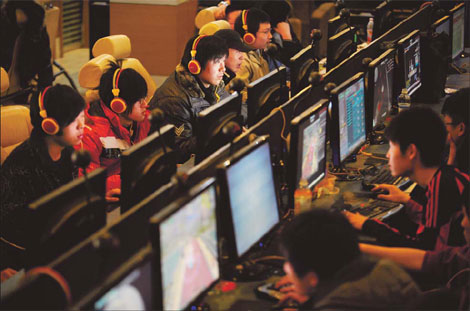Doubts over plan to beat cyber addiction
Observers have raised doubts about the complexity and effectiveness of a guardian project enabling parents to monitor their children's playing of online games.
 |
|
Young people play computer games at an Internet cafe in Taiyuan, capital of Shanxi province, in this file photo taken on Jan 16. |
The Parents' Guardian Project for Minors Playing Online Games, issued on Feb 1 by eight central government departments, including the culture and public security ministries, takes effect on Tuesday.
It requires online game operators in China to provide services to parents so that they can monitor their children's game-playing.
According to a report by the Chinese Academy of Social Sciences last June, the number of teenage Internet addicts in China has risen to 33 million.
A pilot project was introduced in February 2010.
"The parents need to submit an application with detailed personal information approved by the local public security department as well as documents to prove their identities as guardians," said Liu Youcai, public relations manager of NetEase, the China provider of World of Warcraft, one of the most popular online games.
As long as the parents can prove their identity as guardians and the gaming account of their children, the game operators should follow the parents' request to restrict their young children's online game-playing, including setting a limit on the daily or weekly playing time or even imposing a total ban for a certain period.
Liu said that staff members of the company have regularly monitored the game accounts and helped hundreds of parents to prohibit or restrict the inappropriate playing of online games since the trial period began.
But some parents think the application process for the online guardianship is too complicated.
Yuan Jueyan, a 48-year-old mother from Wenzhou, Zhejiang province, whose 16-year-old son spent at least 20 hours a week playing online games, failed to stop her son after trying all kinds of coercive measures such as cutting off the Internet connection and dismantling the computer. But she did not use the guardian project.
"The procedure for us parents to approve our identities is a bit too troublesome. It probably won't be very effective in the end," said Yuan.
In August 2010, the Ministry of Culture issued the Interim Provision of Real-Name Registration of Online Gaming to prevent minors from becoming addicted to cyber games.
There is a three-hour one-time playing limit for minor online gamers. Under this rule, children who have registered with an approved ID card will be forced to go offline after playing for three hours and will not be allowed to play again for five hours.
But technically it is easy for those young people who want to play more.
"Under-age children can easily use a borrowed ID card or use a parent's ID card number to register and play. They can just hide this from their parents," said Chen Yu, a 25-year-old online gamer in Chengdu, Sichuan province.
Therefore, parents have expressed doubts about the effectiveness of the assistance from the websites.
"I don't think this kind of monitoring service will prevent my child from being more addicted to online games as he definitely has other ways to defy my wishes such as creating another account or transferring to other games," said Yuan.
Yuan added that she probably wouldn't force her son not to play online games but would wait for him to become bored with the games.
"It's a government gesture rather than an efficient solution to manage the children, most of whom can control their own game-playing," said an IT engineer who has been involved in research and development of young people's games for more than three years.
"I suggest that parents allow their children to play online games for up to two hours every day. Positive communication with children is needed to help them learn that Internet addiction is harmful to them," said the engineer who did not want to be named.
 0
0 







Go to Forum >>0 Comments